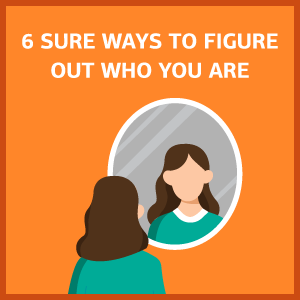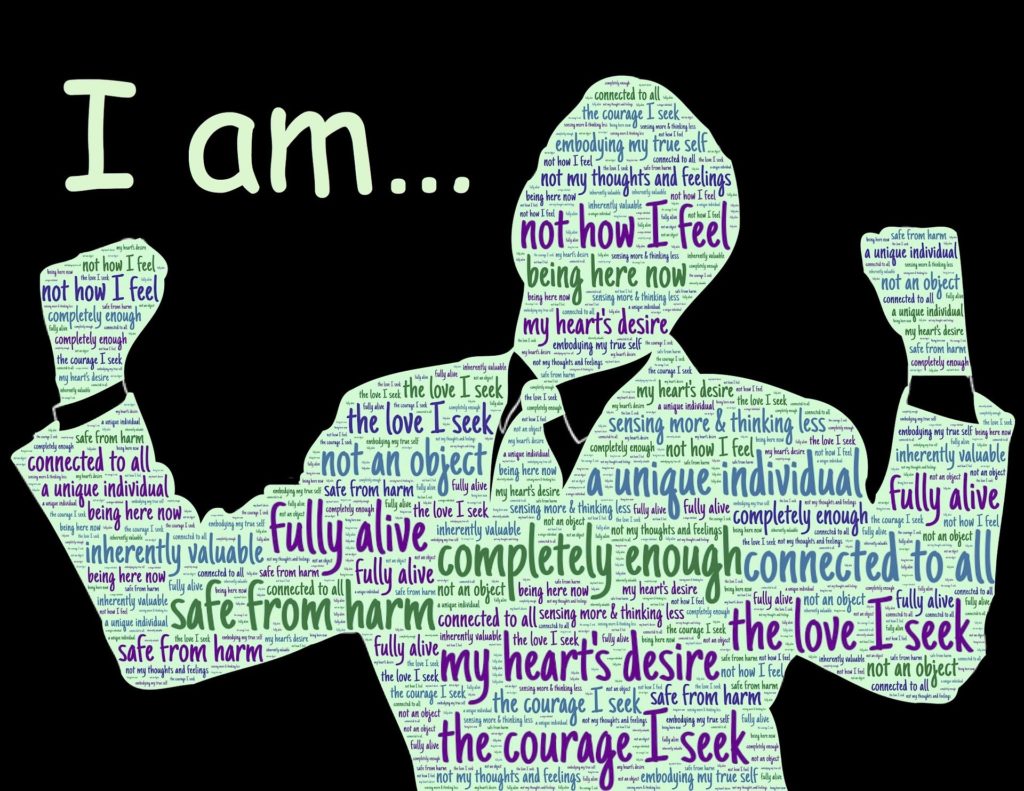how to find out who you are

"Be True" is one of my biggest mantras. But to do that, you need to know how to figure out who you are.
Figuring out who you are is a life-long quest for many of us. If you feel lost right now, or as if you are acting a part in someone else's life story, it's time to begin your journey.
"Should I quit my job and do something completely new? Should I reinvent myself? How do I go about doing that?"
The good news is that you don't need to quit your job and travel to an ashram to begin this work. You can start right now, digging into the layers of your identity and uncovering a path towards a meaningful and purpose-driven life.
The roles you perform for others, your career identity, your likes and dislikes — these create a patchwork of ideas about who you are. But they may not reflect your true authentic self.
These things can be clues, but they may also be a function of trying to please others, perfectionism, or the environment you grew up in.
As adults, we have the opportunity to question our beliefs and behaviors, and ask ourselves where they came from. In the process, we can decide what to keep and what to change.
When you have a clear idea of who you are and your values, you make better decisions and create a life you want.
In this article, I share actionable ways to figure out who you are, and apply this knowledge to lead a happier, prosperous life.
1. Define your core values and beliefs

Every building needs a strong foundation. You can build a beautiful home, but it will fall apart without a solid base.
The same goes for your values. Just like the base of a home, defining your core values provides solid groundwork for all your choices, actions, and behaviors. Once you understand your values and beliefs, you can build the life you want.
Look back at times when you took a stand, or when you regret that you didn't. Consider the people you collect as "your heroes" and what they stand for. You'll notice common themes between these and your deep identity.
You can also use this assessment tool to define your values and beliefs.
Deep identity, by the way, is often expressed by activities of the enteric or gut brain. In other words, a part of identity comes from within. It can also result from outside influences, like our environment (nature) and the people around us (nurture).
2. Allow yourself to grow, evolve, and change

Your identity isn't fixed. Who you are changes with new experiences and lessons learned.
Sometimes, you need to determine how to reinvent yourself, to adapt to shifting goals as you change as a person.
Yet, most people assume that who they are remains the same throughout life. Psychologists call it the "The End of History Illusion." We think our preferences and beliefs won't change, 5, 10, 20 years from now. But this is a delusion. Your values will likely change in the very near future.
Why does this matter so much?
Many changes happen gradually, under the radar without even noticing. In your twenties, you might have chosen to study science. But then, at age 30, your preferences have changed. You feel unhappy, and you can't quite figure out why. You carry on, stuck in a job you don't like, without realizing that it's time to explore a new passion, in art or music, for example.
That's why I recommend reevaluating your dreams from time to time. By examining your current goals, you can see if your daily habits will take you in that direction. If not, it's time to refocus and get your life back on track.
![]()
Do You Really Know Yourself Better Than Anyone? (Hint: Most of Us Don't)
10 (proven) ways to uncover your deep identity.
Grab our FREE cheat sheet today. Drop your email below.
3. Change your environment — not yourself

Our environment impacts who we are, by a lot.
Family, friends, community, and work environment; the people who we interact with and situations faced on a regular basis dramatically influence our thoughts, motivation, and mood.
That's good news. It means that by changing your environment, you can make positive changes. You can bring your environment into alignment with your values — instead of struggling to fit into your environment.
One way you change your environment, without drastically changing your life, is to start spending more time with supportive, loving people who share your values.
If it's not possible to bring your values into your present environment, you may need to start exploring bigger changes. For example, relocating to a new city may offer the kind of collective culture that supports your goals. Switching careers to work in a setting that inspires creativity and teamwork could bring those values to the forefront.
Keep in mind that many environmental influences are subliminal. According to the mere-exposure effect, the more we become exposed to something, the more we tend to like it.
Advertisers rely on this phenomenon often to influence our values, without us even realizing it. We get the urge to buy a luxury car, start a family, or look a certain way, not knowing whether those things actually matter, or if we just saw it on TV.
That's where self-awareness is key. When you understand your values, and who you are, it's easier to differentiate whether you really want something, or if you were told to want something.
4. Overcome limited thinking patterns

A disconnect can happen if you change and grow, while your self-image stays the same. There is a rift between who we are and who we think we are. This can create a barrier to success.
Let's say, you have always told yourself that you were shy, perhaps because of difficulty making friends while growing up. But socializing, like any skill, can be learned. While you may have felt shy at 16, as an adult, you have gained experience to feel comfortable speaking in front of a group or meeting new people.
Still, you continue to tell a story in your head that "you are shy and socially awkward." So you avoid networking events and social gatherings. You can see how this would hold you back from opportunities and realizing your potential.
That's the point when you need to recognize limited thinking patterns that no longer serve you. Self-criticism, perfectionism, and binary thinking are other patterns that can keep you from showing up as your authentic self in all areas of life.
Speaking to a coach or supportive friends can help you recognize these thinking habits and replace them with a more well-rounded perspective.
5. Challenge your self image

We cannot reach peak performance without having a strong self-image. I'm not talking about a grandiose opinion of yourself or delusion. When you gain a better sense of self, you will find it a lot easier to play to your strengths and lead a life that brings you joy and fulfillment.
Over time, it can even feel second-nature.
Our sense of self relies heavily on how we feel we are perceived by others. Unfortunately, we gain most of these impressions passively, in everyday situations, through a biased lens. We constantly monitor our own performance, compare ourselves to others, and rate ourselves based on very little feedback.
As a result, we hold ourselves back from situations where we may find new strengths and create new possible identities.
Can you remember a time when you performed at your A-game? It kind of feels like you're "in the zone" when you perform at your best.
I know when I really crush it during a fencing tournament, I no longer need to overthink. I feel in the flow, able to lunge and counterattack instinctively.
Think about it. The last time you reached peak performance, you were in flow. Flow is a wonderful feeling, and it happens when the conscious, subconscious, and self-image work together in equilibrium.
When you establish a strong sense of self, you can lead a life "in the flow." In his book, With Winning in Mind, Olympic gold medalist Lanny Bassham explains his Mental Management system:
Self-image makes you "act like you" naturally. It is the total of your habits and your attitudes. Your performance and your self-image are always equal.
Because self-image is so important, don't leave it to chance. Work to establish a sense of what your strengths are, and invest in developing those strengths. Not only will this help you believe in yourself, but it will increase your success.
To start building a stronger self-image, consider composing a "Reflected Best Self Portrait," as I use with clients to reinvent their career identities.
6. Balance identity with an open mind

Outside influences can open us to new perspectives. But they can also get you in trouble if you don't know your personal boundaries. Before long, you find yourself living according to what other people value, rather than what makes you happy.
So remember to keep an open mind— but not too open. It's good to approach life with an open heart and a willingness to try new things. But sometimes, that can go too far.
When you understand your core values, you have a better idea of how to balance an open mind while still living according to who you are.
Remember, figuring out who you are can take time and experience. Sometimes we don't know who we are until someone or something reflects back to us pieces of our own truth.
When we finally learn to be our authentic selves, it increases your chances of success and living a joyful life with meaning.
And when you're ready to figure out who you are, you don't have to do it alone!
We're here to help, and we'd be honored to guide you.
![]()
Do You Really Know Yourself Better Than Anyone? (Hint: Most of Us Don't)
10 (proven) ways to uncover your deep identity.
Grab our FREE cheat sheet today. Drop your email below.
how to find out who you are
Source: https://soulsalt.com/how-to-figure-out-who-you-are/
Posted by: beckvauddeas.blogspot.com

0 Response to "how to find out who you are"
Post a Comment